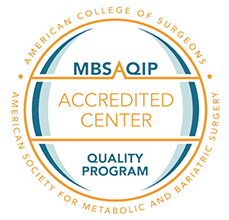 The Weight Loss Center at Texas Health Flower Mound offers comprehensive weight loss programs complete with diagnostic, surgical and non-surgical options designed to promote a full and healthy life. Our bariatric team consists of board-certified bariatric surgeons, experienced bariatric providers, nurses, dietitians and coordinators.
The Weight Loss Center at Texas Health Flower Mound offers comprehensive weight loss programs complete with diagnostic, surgical and non-surgical options designed to promote a full and healthy life. Our bariatric team consists of board-certified bariatric surgeons, experienced bariatric providers, nurses, dietitians and coordinators.
A dedicated weight loss specialist will be with you each step of your experience - from your initial appointment, through diagnosis, treatment, after your procedure and assisting with your follow-up maintenance appointments.

-
Gastric Sleeve / Vertical Sleeve Gastrectomy
As one of the newer standalone stapled weight loss procedures, the gastric sleeve has quickly become the most popular bariatric surgery in the United States. It is a straightforward procedure that removes 70-80% of the existing stomach pouch in a vertical manner, using restriction alone to achieve long-term results similar to the gastric bypass. The gastric sleeve does not alter the small intestine in any way.
How It Works
The gastric sleeve is a surgical weight loss procedure that permanently removes approximately 75-80% of the stomach. This laparoscopic procedure makes the sleeve long and tubular, resembling a “banana shape” allowing the stomach to remain intact with no part of the intestine modified or bypassed.
The sleeve benefits patients by removing the fundus of the stomach, which produces much of the “appetite hormone” ghrelin. As a result, patients receive additional help suppressing their hunger or appetite.
As with all surgical procedures, there is a degree of risk which may be exacerbated by poor health due to obesity.
Results of the Gastric Sleeve
Typical weight loss in the average patient may range from 50 to 75%, and many patients may see an improvement or elimination of type II diabetes, high cholesterol, high blood pressure and sleep apnea. While the gastric sleeve offers more modest weight loss rates versus the gastric bypass, long-term excess weight loss and maintenance is almost the same.
Potential Benefits of the Gastric Sleeve:
- Lower incidence of long-term complications compared to gastric bypass surgery
- Excess weight loss results are exceptional
- Obesity-related disease improvement rates are excellent
- No implants as with gastric banding
- Performed laparoscopically, and with robotic assist in some cases, which means less pain, less blood, generally fewer initial complications and a short hospital stay
- Less maintenance compared to the gastric band
After Gastric Sleeve Surgery
Typically, the sleeve requires an overnight stay, a day shorter than the gastric bypass and longer than gastric banding (an outpatient procedure). Once home, patients will limit strenuous activities according to their postoperative guidelines. Patients typically return to work within 2-3 weeks and normal activities within 6 weeks, with surgeon approval.
Gastric sleeve patients take a multi-vitamin supplement for the rest of their lives and follow a diet and exercise program that combines moderation and nutritional balance.
Our program’s approach is to re-educate the patient in order to adapt to the new post-surgery lifestyle. Food budgeting, exercise, vitamins, portion control, speed at which one eats, and behavior modifications will be important lessons and topics during your visits and support sessions.
-
Gastric Bypass
Long considered the gold standard in bariatric surgery, the gastric bypass offers the greatest excess weight loss and obesity related disease resolution potential of any of the procedures we offer. The bypass works by both limiting the amount of food the patient can eat (restriction) and limiting the number of calories absorbed through the small intestine (malabsorption). It can be particularly useful for those suffering from uncontrolled type-2 diabetes or acid reflux.
About the Procedure
Gastric bypass is generally performed in a minimally invasive (laparoscopic) manner. This means that specially-made surgical tools, including a high definition camera, are passed through tiny incisions in the abdomen.
During surgery, your surgeon creates a small gastric pouch by dividing the stomach. This new pouch limits food intake (portion control). The surgeon then attaches a section of the small intestine (jejunum) directly to the new pouch. This allows food to bypass a portion of the small intestine (duodenum), which normally absorbs calories and nutrients. Having the smaller stomach pouch causes patients to feel full sooner and ultimately eat less food; bypassing a portion of the small intestine means the patient’s body absorbs fewer calories.
Unlike the gastric sleeve, the larger portion of the stomach is not removed from the abdomen. Rather, it remains, without accepting food, but continuing to produce digestive enzymes that are delivered to the intestine. As you eat less food and absorb fewer calories, your body may stop storing excess calories and start using its fat supply for energy.
Results of the Gastric Bypass
The gastric bypass is a very effective weight loss tool with potential excess body weight loss of typically upwards of 80%. The bypass is also effective in eliminating or improving many of the diseases associated with morbid obesity. The gastric bypass is particularly effective for those suffering from type-2 diabetes, which in many cases, will go into remission within days or weeks of surgery. The mechanism by which the gastric bypass improved diabetes so quickly, even without appreciable weight loss, was largely unknown. However, researchers now believe that the modifications to the small intestine may rebalance the patient’s gut bacteria.
Patients with severe and uncontrolled acid reflux may benefit as well.
Typical Benefits of the Gastric Bypass Include:
- Patients report an early sense of fullness and satisfaction that reduces the desire to eat.
- Patients generally lose more weight sooner than patients who undergo purely a restrictive procedure.
- Obesity related disease resolution rates are excellent.
- It can be performed laparoscopically, which means less pain, less blood loss, and shorter hospital stay.
- Built in negative feedback reinforcement with Dumping Syndrome, which produces rapid movement of food through the small intestine leaving the patient uncomfortable. This provides warnings signs that too much sugar and fat is being consumed, thus reinforcing healthy food choices.
Considerations and Risks of the Gastric Bypass
The Gastric Bypass is still a major surgery and comes with a degree of surgical risk which may be exacerbated by a patient’s poor health due to obesity.
- If any staple line begins to leak, the results could be bleeding or infection in the abdomen, which requires emergency care and surgery.
- The Gastric Bypass is treated as a permanent approach and is not adjustable. However, the procedure can be revised if it does not produce the desired results.
- There will be a hospital stay with this procedure.
- There are potential risks of anastomotic leaks; fistulas; intestinal irritation and ulcers; Dumping Syndrome; vitamin and mineral deficiencies such as iron, chronic anemia, vitamin B12 and calcium. This will require lifelong vitamin supplementation. It may also present lifelong difficulty in visualizing the lower stomach and segments of the small intestine when using endoscopy.
After Gastric Bypass Surgery
The typical hospital recovery time after a gastric bypass requires one to two days. Once home, patients will practice appropriate wound care and limit strenuous activities according to their postoperative guidelines. Most patients return to work within 2 weeks and normal activities can be resumed within 6 weeks, with surgeon approval.
Like other bariatric surgeries, gastric bypass patients will take a multi-vitamin supplement for the rest of their lives. Patients will likely take additional supplements because of the limited absorption of nutrients in the small intestine. These may include Vitamin D, Calcium, Vitamin B12, Iron and more. Periodic blood tests will ensure that any nutritional deficiencies are found and addressed appropriately. As with any bariatric post-op program, patients will follow a diet and exercise program that combines moderation and nutritional balance.
Our program’s approach to food budgeting, exercise, vitamins, portion control, speed at which one eats, and behavior modification such as refraining from drinking while eating is exactly the same regardless which procedure is chosen.
-
Revision Surgeries
As is possible with any surgical procedure, bariatric surgery does not always turn out as planned. While complication and mortality rates have steadily decreased over the years, on average, it is important to remember that these procedures are complex and serious, and for one reason or another, may fail at some point in the future.
When a patient expresses to us that they are unsatisfied with the results of their past bariatric procedure, we begin by analyzing their diet and exercise regimen. Post-surgery lifestyle changes are a key component of success after bariatric surgery and some patients may not have been ready to undertake critical lifestyle changes such as modified eating and improved workout habits. If this is the case, then revision surgery will not be performed. Rather, we will work with the patient to analyze possible problem areas and develop a comprehensive plan to address them.
In some cases, the primary procedure may have failed due to gastrointestinal anatomical problems or a case where the surgery was not appropriate for that particular patient. In situations like these, the most important next step is to figure out why the procedure failed. Upon learning the underlying reason, and then approving a patient for revision surgery, we must then evaluate the options available to them.
When to Call Us
Just as in a patient’s pre-bariatric lifestyle, weight will fluctuate. These fluctuations may be caused by temporary dietary changes, menstrual cycles and a multitude of other factors. However, when the ups and downs become rapid and significant, this may warrant a call to our office. We suggest that all our patients keep a journal of their diet and exercise regimens. Another useful factor to journal is mood. Stress, anxiety, sadness and even happiness can all contribute to weight gain, as we often use food both to medicate and celebrate. The bottom line? Discuss your challenges in a support group or call our office if you believe something is not right. We’re here to help.
The Most Common Bariatric Surgery Revisions
Gastric bypass revisions are most often employed to correct stretching of the gastric pouch or stoma. This can happen slowly over time as the stomach is a very adaptable organ. There are several remedies to address this issue that can include minimally invasive and endoscopic (no incision) procedures. Patients should be aware that after they reach their goal weight, they may gain back 5-10% of their excess body weight loss – this is natural and does not require a revision.
The sleeve gastrectomy, or gastric sleeve, removes a significant portion of the stomach pouch, but can be revised by converting into a gastric bypass. In doing so, we add a malabsorptive (restriction of the absorption of nutrients in the intestine) component to the sleeve. This combination can offer the jump-start a patient needs to get back on track.
The gastric band can be revised to virtually any other procedure, assuming that the patient qualifies. Remember, some patients can qualify for a Lap-Band with a BMI of as low as 30 – it is important to remember that these patients may not qualify for a stapled procedure. Since the band does not permanently alter any part of the digestive tract, the original band can be replaced or the band can be removed and a stapled procedure such as a gastric bypass or gastric sleeve can be performed.
Revision surgery should not be taken lightly. These surgical procedures are still major surgery and come with all the risks associated with any other bariatric procedure. In fact, the risks of the revision procedure are actually heightened due to the fact that the patient will have already had abdominal surgery. Risks of complications may also be greater. While we do not encourage patients to revise their primary bariatric procedure in every case, we do understand that it is important and necessary in some. We will help you determine if your case qualifies for a revisional bariatric procedure and discuss solutions according to your specific need.
-
Duodenal Switch
This effective weight loss procedure is additional to the sleeve gastrectomy. The lower intestine is divided much further downstream than a gastric bypass to the point of the duodenal. This operation can be performed in two stages: sleeve gastrectomy first, followed 9-12 months later by the intestinal bypass.
WATCH NOW:
Duodenal Switch Surgery -- Texas Health Flower Mound
Advantages of Duodenal Switch Procedure:
- Greater weight loss than all other bariatric procedures
- Preferred for patients with BMI>45
- 60 - 70% excess weight loss
- Patients eventually eat normal-sized meals
- Reduces fat absorption by 70 percent
- Gut hormones changed to reduce appetite and improve satiety
- Most effective against diabetes and hypertension
- Offers solutions for people who have regained weight after lap band, gastric bypass or sleeve surgeries have not worked for them
The Biliopancreatic Diversion with Duodenal Switch is a surgical procedure with two components. Similar to the sleeve gastrectomy, a large portion of the stomach is removed leaving a small, tubular pouch. Next, the duodenum or entrance to the small intestine is split and redirected to the base so food bypasses most of the organ.
The divided small intestine is then joined at the bottom allowing maximum digestive juices to mix with food for a much shorter period but long enough for some fat absorption to take place.
The restrictive component of the Duodenal Switch is achieved by partial gastrectomy which reduces the size of the stomach.
The malabsorptive component of the Duodenal Switch is achieved by rearranging the small intestine to separate the flow of food from the area of bile and pancreatic digestive juices. Food bypasses most of the area where chemical breakdown and calorie absorption normally occurs.

-
Is bariatric surgery safe?
Bariatric surgery, like any other surgery, does have risks and should be discussed with your primary physician and our surgeon. However, there are times when the surgical risk of bariatric surgery is lower than the risk of living with obesity and its related co-morbidities. That’s when surgery is ideal. Complication and mortality rates have been dropping over the past decade and laparoscopic techniques have further reduced the incidence of surgery-related complications.
-
How do I qualify?
Qualification criteria include weight vs. height (BMI), the presence of health conditions, age and surgical risk, among other factors. We will perform a full evaluation of your condition after your consultation and let you know if you qualify under our guidelines and, if applicable, under those of your insurance company. Find out now.
-
How can I pay for surgery?
Insurance:
For patients who have insurance, the first and most important requirement is to know if your insurance plan covers bariatric surgery. You will also want to find out what requirements your insurance company has in order to pre-approve you for the specific procedure in which you are interested. Insurance companies generally have strict qualification standards and knowing these standards beforehand can be very helpful in ensuring a smooth insurance process.
Cash Pay:
Our program offers flat rates for bariatric surgical services in order to reduce your total-out-of pocket expense. Cash pay patients should speak to our patient coordinator for the specific contracted rates. We strive to offer any guidance that we can, however we do suggest that you consult with your financial professional, in order, to fully understand your options and the impact to you.
If you need to explore payment options please call 469-698-1622.
-
Will my insurance cover surgery?
This depends on the insurance provider, your specific plan and its exclusions, as well as the procedure being performed. Many insurance plans cover bariatrics however the specifics of your plan are outlined on your plans website or through employer Human Resources departments. If you have questions please consult your insurance company or reach out to us for general questions.
-
Who is on the care team?
Your care team at the Texas Health Flower Mound Bariatric Center will consist of the following skilled specialists:
Weight Loss Surgeon
Typically, your weight loss surgeon specializes in minimally invasive bariatric surgery and minimally invasive general surgery and has received advanced training through the American Society for Metabolic and Bariatric Surgery (FASMBS). Your surgeon has experience performing gastric bypass, gastric sleeve (sleeve gastrectomy), gastric band and revisional weight loss surgery procedures. They place a priority on lowering your risk of life-threatening health problems through an effective and tailored weight loss solution.
Bariatric Nurse Practitioner / Coordinator
Think of our program coordinator as a liaison between you and your surgeon. She will help you get your questions about surgery answered and will support you and your family with education to get you on the right path for your needs.
As a former weight-loss surgery patient herself, she can bring a unique insight to what to expect on your weight-loss journey.
Clinical Reviewer
Our clinical reviewer focuses on providing you with the utmost in program quality based on compliance to program standards established by a national bariatric organization. Think of her as a quality assurance detective.
-
Why do I need a psychological test?
Psychological tests are not performed to determine mental health issues, but to ensure that you are prepared for the lifestyle changes you will have to make after surgery. Your body and mind will be going through many changes as you lose weight, and we must be sure that you are ready and willing to embark on this new journey.
-
How long will I be in the hospital?
The average patient will have a one day stay for gastric sleeve procedures and a two day stay for the gastric bypass and Duodenal Switch. Of course, each case is unique.
-
Is bariatric surgery right for me?
In the end, you along with your surgeon will be able to answer that question. Every case is different and while some patients enjoy great success after surgery, there are many potential patients on whom we never operate because they are not ideal candidates. Your particular health situation, your willingness to work hard to lose weight, and the results of your testing will let us know if surgery is right for you.




